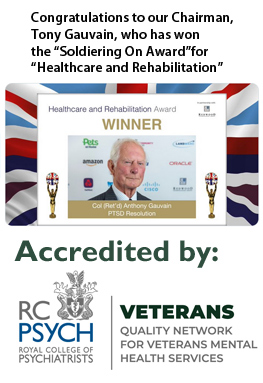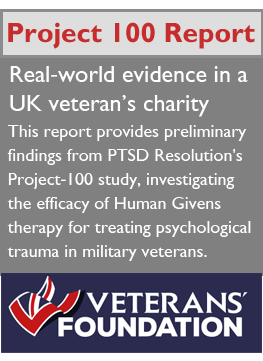Guiding Principles

Guiding Principles The aim of these principles is to help ensure that organisations which provide mental health care for Veterans and their families or the families of still serving personnel do so in a manner which is safe, does no harm and allows the Veteran to make properly informed decisions about the care they might receive. Agreeing to abide by these principles does not confirm that a particular treatment will be effective, or that all the organisations which do so, or their employees, are exemplars. However PTSD Resolution (Resolution) has agreed to follow these principles as part of the steps it takes to provide a safe and reasonable service and do no harm. Resolution will: a. Communicate where possible with the Veterans' GP about any initial assessment and then at regular periods during follow up and at the end of any course of therapy/treatment. Where a Veteran does not have a GP, we will assist them to get one prior to, or at the very least alongside, beginning treatment. Veterans may self-refer to Resolution without having to use their GP as a 'gate-keeper'. However, the Veteran's GP will be informed of, and where appropriate consulted about, any assessment undertaken and any care plan that is decided upon. b. Only commence any treatment once a formal broad-based initial assessment of need and risk has been undertaken by an appropriately qualified therapist. This assessment may require some communication with other healthcare professionals such as the Veteran's GP, and may involve other appropriate individuals. Where substance abuse is a problem for Veterans the extent of this problem should be always be assessed and opportunities for intervention should be discussed. c. Ensure that Veterans are encouraged to access evidence-based and NICE approved therapies before discussing other possible interventions. Veterans in crisis should instead be supported to take actions to ameliorate the crisis and pay due regard to any risks. Once the crisis has eased then discussions of the most appropriate therapeutic options can proceed. d. Discuss possible interventions in three broad groups: |
f. Ensure that all therapists abide by their codes of professional practice which will as a minimum include displaying an understanding of boundaries, responsibilities for dealing with confidentiality and the need to have appropriate supervision and governance; and interact with other statutory bodies (e.g. social services, safeguarding boards, the Police, etc.) and professionals (e.g. social workers or other clinicians/professionals). g. Mandate that risk assessment will be a core element of all clinical/therapeutic interventions; the degree of risk assessment undertaken will be dynamically assessed and will be appropriate to the service user's presentation. Risk assessment will include consideration of risks to self, others and also adult and child safeguarding and protection concerns. All providers will have procedures in place to act upon and communicate concerns commensurate with the risks to the appropriate agencies in a timely fashion whilst paying due regard to confidentiality. h. Ensure, via the HGI, that all clinical/therapeutic staff will have appropriate training in safeguarding and child protection as well as discussing these matters with their clinical supervisors (who will also be appropriately trained and experienced so they can provide the effective and safe clinical supervision). Update training on these topics will be undertaken in accordance with good professional practice and national guidance. Resolution has a complaints procedure which is objective and rigorous, controlled by a body which is registered with the Professional Standards Authority (PSA). Serious Events will trigger analysis and the results will be communicated appropriately. j. Will not put anyone under any pressure to give Resolution financial or other support (e.g. media interaction, fund raising, etc.). Anyone who wishes to help in whatever manner will be assessed as to their suitability to do so and will be appropriately supported, particularly where the media are involved. k. Carry out clinical audit using outcome measures recommended by the Department of Health. We are delighted to work with other organisations and coordinating bodies to pool data for public benefit of all whilst paying due regard to confidentiality and data protection. l. Resolution staff are expected to behave in an ethical way at all times, including when offering choice and/or recommending or referring to other providers of care. This is so as not to adversely influence vulnerable users and their carers, or unduly promote a service in which they have an interest, or denigrate another except where there is clear evidence to demonstrate risk and appropriate reporting action has been taken. |




